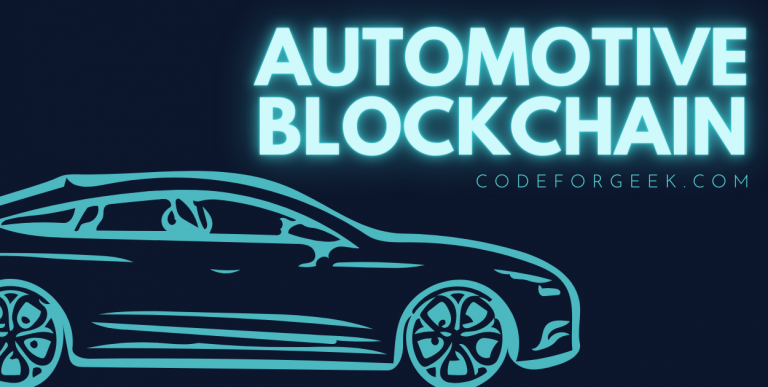Today is an interesting topic I am discussing; blockchain in automotive industry.
In the 21st century, cars are getting smarter. Blockchain technologies have had a nice share of admiration in almost every industry, and the automotive industry isn’t an exception.
When we say blockchain, most people think of Bitcoin. While cryptocurrencies have been the best-known use case of blockchain technologies, there are multiple others that most of us are unsure about. It has made the lives of drivers and motorists lives easier in unimaginable ways.
“Blockchain technology gives us the technical foundation we need to create helpful and effective solutions.” – Dr. Andre Luckow, Head of Distributed Ledger and Emerging Technologies at the BMW Group.
In this article, I will be explaining what blockchain is and potential use cases of blockchain in the automotive industry for both drivers and manufacturers.
So, let’s begin.
What is Blockchain?
A blockchain network is nothing but is a shared or decentralized ledger system that is like a chain of connected blocks. In this system, records of transactions are stored cryptographically in blocks to keep data confined in them, secure.
A copy of a transaction is stored across various nodes or computers scattered around the globe. These blocks also contain other data in them. This data stored in the blocks on the blockchain network is immutable. Meaning, no one can ever change or delete them. They live in their assigned blocks forever without anyone having the ability to tamper with them.
For changes to take place, they must be validated and verified by the nodes on the network. If all nodes on the chain validate them, the changes will take effect. If at all someone tries to tamper with the data stored in these blocks, these nodes may disagree and the changes will not take place.
The system, in this way, offers and maintains transparency and integrity across the network although there is an absence of all central bodies like governments or banks.
The architecture of the system is such that every previous block is linked to the next block. This allows for the information to be linked with each of the blocks that are scattered on the network. Access to this data is exclusively given to users with the right key to the blocks.
Blockchain ledgers are immutable meaning they cannot be changed by any means or deleted by anyone. Once recorded, this data lives in the block forever in its original form!
Learn more about blockchain technology here!
Blockchain in Automotive Industry: Amazing Use Cases & Applications
Now let us get started with the use cases and applications of blockchain in automotive industry for both motorists and manufacturers.
1. Digital Automobile ID
First on the list of use cases of blockchain in automotive industry is a digital vehicle ID.
Let’s say you are buying your first car online and want to start with a used one. Now you are going to have so many questions going through your mind; how long has been the car used? What’s its mileage? Is it in its insurance period? And whatnot. With the emergence of blockchain solutions, used car buyers can now get to know all this information about the car in one place.
One example of blockchain in the automotive industry is the VerifyCar platform. It is currently in the test stage and will let buyers know if the vehicle’s data like mileage, insurance coverage, etc., is verified or not.
2. Safe Resources & Raw Material Sources
Another way blockchains can help the automobile industry is by keeping track of and documenting supply chains of the materials moving into manufacturing units.
Manufacturers will be able to keep a check on how the supply is moving, through places and middlemen, and where it is. This is useful especially in the case of raw materials like wolframite and cobalt coming from developing countries, which are difficult to track.
3. Smarter Insurance
Next on the list of use cases of blockchain in automotive industry is smart insurance. Blockchain technology comes with the feature of the immutability of data. this means no one can ever change the data or delete it. This enables transparency to users of the chain. This feature can be benefitted by car insurance businesses to provide unchangeable, transparent, and highly secure logging of the vehicles’ sensor data on a blockchain.
This way blockchains can help, especially autonomous cars, resolve the circumstances of an accident.
4. Leasing & Vehicle Financing
Last but not least in the list of use cases of blockchain in automotive industry is in leasing and financing of vehicles. With the emergence of smart contracts, people will be allowed to augment and automate various processes in the vehicle leasing and financing sector. For example, users will now be able to prevent car lease rent delays with the help of deactivating the car unlock system!
Conclusion
In the 21st century, along with humans, cars are getting smarter. Blockchain technologies have had a nice share of admiration in almost every industry, and the automotive industry isn’t an exception.
In this article, I will be explaining what blockchain is and potential use cases of blockchain in automotive industry for both drivers and manufacturers.





